ALL YESTERDAY’S PARTIES
A projection reads “1,000,000 Years B.C.,” and the countdown (count up?) begins; that’s a lot of numbers to scroll on a stage bare of performers, and it’s a few minutes of tedium before the counter gets to the 200,000s and a naked man (Sean Patten, in a blond Glam wig and fuck-me pumps) walks onto the stage. Is he a caveman, as the numbers would suggest? Maybe. He is joined by a naked woman (Berit Stumpf, in identical accoutrements), and they pair up, holding hands. Another naked woman (Sarah Thom) enters, similarly tricked out, and the two ladies pair off; Patten is shamed, alone, covers his privates, looks sad. Enter another naked man (Bastian Trost), more glammed-out than the others, on higher heels, carrying shopping bags, essentially out-womaning the women. Why is unclear. Technicians file in behind banks of audio-visual boards stage left. I am actively bored.
The British-German ensemble before us, Gob Squad, takes the next several minutes to dress (lots of gold lamé) and to set the stage with a couch, an end table, chairs, microphones, video cameras. By the time the counter gets up to 2014, they have rolled a second screen to the stage lip, sandwiching the living room-ish set. The performers address the audience: they’ve found a 3-minute YouTube video of an awkward family party that they say is a great metaphor for western civilization. They can’t show us the video though because of liability issues, so they will need seven audience members to come onstage and embody these characters. My stomach growls. I can’t be hungry.
I badly want to leave. My attention wanders. I’m thinking of the context in which shows like this travel internationally, of the impetus of young artists (Gob Squad formed 20 years ago; its founding members are now in their 40s) to externalize their differences with existing forms. I’m hearing the questions the artists are asking each other when things get too dull onstage, the improvised answers they give, and I’m weighing the likelihood that these nuggets of interest are trapped in a lode of dullness on purpose. Counterpoint’s a thing. Is that it?
I’m thinking about intention vs result; I’m wondering whether I have the language to appreciate what this show has to say. Is it prejudice or experience that leaves me cold? Do I dislike so much postmodernism because it’s not to my taste, or are these experiments conducted largely without expectation? Is it okay with me to spend evenings watching people work out their mission? I’m listening to Berit tell us that stuffed animals will be tossed into the audience, that catching one means you’re supposed to go up and be in the show, that if you don’t want to you can toss it to someone else. I’m thinking, “I’m here to review, I won’t have to worry about that nonsense. Besides, there’s a couple hundred heads in REDCAT tonight. What are the chances.” My stomach rumbles. I need to go to the bathroom. Bastian’s tossing plush objects at us.
A stuffed raccoon lands exactly in the crutch of my elbow and biceps. I have caught this toy in the cradle that Marcus Allen used to carry footballs toward the goal line. It feels like a sign. I think, “Well, if I’m in the show, I don’t have to watch it. Better still, I can’t write about it. My resumé does not require another negative review.”
I pick my way from the middle of the house to the stage. My raccoon is taken away and I am given a shiny shoulder bag with a receiver in it, connected to headphones I place over my ears. We impromptu performers are given instructions via these headphones: walk here, stand there, eat this cake, enact a preselected program of behaviors Gob Squad has drawn from its YouTube video/found object inspiration. We are tools of the production.
I dance with a pair of lovely women. I eat the cake. Our antics are projected onto the downstage screen for the benefit of the audience. Busy now, I have forgotten my stomach troubles. But we in headphones are cut off from the show we are in; we don’t quite know what’s happening. I thought I could tell where it was going before, and even with limited aural input I see that I am right. The show considers existential questions of unity, of social coherence. I know from talking to audience members afterward that the professionals spend time commenting on their interpretation of our interpretation of the re-enactment. They pretend to try to interact with those in headphones, but they know we’re busy taking direction. The disconnect, the imperfection, jibes with the theme of finding the beauty and drama in mundane moments. The awkwardness onstage is a source of some amusement for the crowd, which is uncomfortable on our behalf but not as much as they are grateful for our taking the bullet.
Making audiences uncomfortable is a staple of cutting-edge theater. Some people like that. I like it. I also feel that it’s un-American to charge people to go to work, especially when they expect to relax and “watch a show.” I wonder about this as I go through the motions of performance. Surely this uptight, waning theater culture will need a good shaking to wake it up again; surely getting the audience on its feet isn’t so bad. But what if, ambulatory now but deaf and at any rate imprisoned onstage, the audience cannot learn? Made incapable of catharsis, we are denied the joy and agony of communion, of appreciation. Why then have we come? Is our service to the remaining audience our takeaway? Are we in an enforced altruism? How valuable is that? How many times would we willingly repeat the exercise?
After our work creating theater on behalf of Gob Squad, most in headphones are directed to a long table stage left, given Champagne and chocolates. The professionals are very nice to us. One of us is still out there, mouthing words sent into his head by the cast members as he is puppeteered through a dialogue with Sarah. We in headphones are allowed to remove them, are encouraged to watch the show over our shoulders. But not having seen all the nuance and detail that led to this moment, it’s impossible for us to appreciate it. We stare, waiting for the people to stop talking. Finally, they do; we are led to the stage lip and told to watch the screen with the audience.
The busy technicians have made a brief video of our pretend party. It plays for a minute. Everyone is impressed to see that we’ve made a video. We’re told it’ll be up on YouTube soon. (Click here to see a video created for a performance in Berlin.) We bow together, we drafted soldiers; we are directed back to our Champagne, and Gob Squad bows. At REDCAT, I’ve rarely seen an audience stay seated for a curtain call, but this ovation goes long. Gob Squad takes so many bows that one of its members makes a half-invested gesture for us to join him. None of us takes him up on it.
In the lobby, we who wore headphones are mock-congratulated; I meet several nice people who say that I should come back and watch the show as an observer this time. I decline to consider it. I hit the restroom and drive home. I am a little put out that by being a good sport and playing the game, I have been excluded from enjoying it. I have very much not enjoyed it. I feel used and cheated. I doubt everyone who wore headphones feels this way; we have a story now. But the loosely funneled energy of this show is its entire appeal: unknown things can happen. There will be good and less good nights. Given the perfect confluence of conceit and audience energy, it could be great…to watch. I decide that writing this critique is at least as valid as asking an audience to perform.
The very next night, at another show in another town, I see a number of people I interacted with at the Gob Squad show. One of them was my onstage dance partner. It occurs to me that the exclusive nature of the demographic interested in theater lends itself to insular entertainments. We’re all at the same party already.
photos by Steven Gunther and David Baltzer
Western Society
Gob Squad
The Roy and Edna Disney / Cal Arts Theater (REDCAT)
scheduled to end on September 20, 2014
for tickets, call 213-237-2800 visit www.redcat.org
for more info, visit www.gobsquad.com

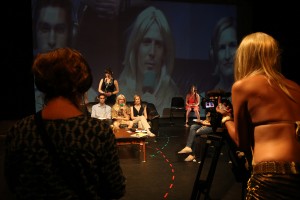
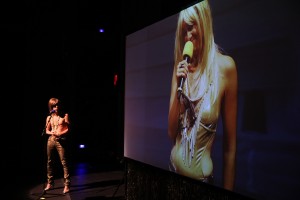
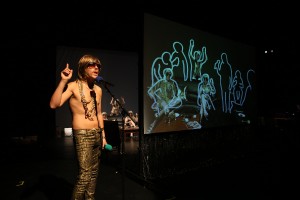
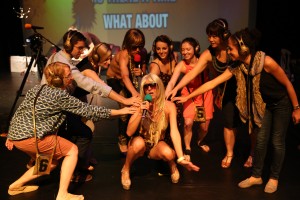
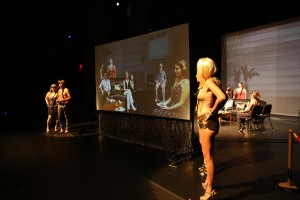
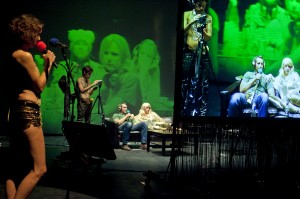
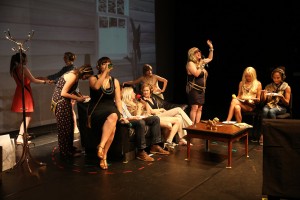

{ 2 comments… read them below or add one }
I saw the performance in which Mr. Rohrer participated. For me as an audience member, the show flipped from unbearable tedium to sheer brilliance (at almost two hours, the tedium won out). The event went from self-expressive to self-analyzing to self-effacing to self-indulgent. When moments of humor and poignancy arrived (such as when players interviewed each other or when they reenacted their personal family dramas with chosen audience members), it was almost a revelation. But then it was back to the tedium. Which means that this performance art is indeed a microcosm of what it means to be human, let alone a member of Western Society. I think PoMo lovers will eat this up, even if the show drags.
Interestingly enough, last week was Gob Squad’s SUPER NIGHT SHOT, which had the quartet videotape themselves on the streets of downtown immediately before the show. The one-hour video work (also improvisational within a fixed context) was shown onstage, and it never reached its potential. For a group that relies heavily on improv, I find their skills in that department pale next to the long form improv geniuses at Impro Theater.
I must add that Gob Squad creates uncannily theatrical moments which rival the best you can see on any stage: You just have to ask yourself if the work required of you to sit through periods of mediocrity is worth the special moments.
Having to hear “California Dreaming” so many times (or once) was torture.
P.S. Can we get back to Jason’s biceps?